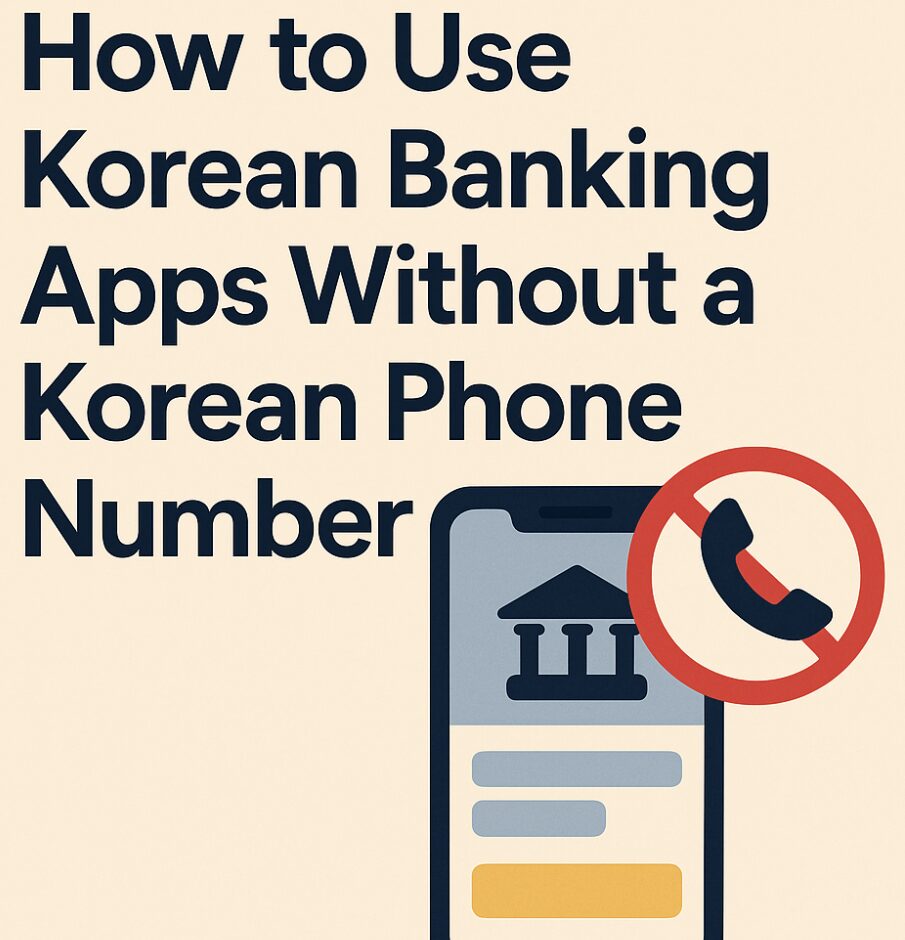(And What to Do If Your Visa Has Expired)
If you’ve recently moved out of Korea — or your visa has expired but you still have a Korean bank account — you may suddenly find yourself locked out of your Korean banking apps. Whether it’s KEB Hana, Shinhan, KB Kookmin, or Woori, most mobile banking apps in Korea require active Korean mobile phone numbers linked to your 주민등록번호 (resident registration number) or 외국인등록번호 (alien registration number) for SMS authentication. But what happens when your ARC (Alien Registration Card) expires or you switch to a foreign phone number?
This guide is designed to help foreigners living outside Korea who still need access to their Korean bank accounts — whether for refund purposes, tax returns, pension deposits, or simply accessing funds.
We’ll walk you through:
What causes these app access issues
What your options are if you no longer have a Korean phone number
How to verify identity overseas
Bank-specific workarounds and how to speak with English-speaking support
Realistic solutions for long-term access or closure

Why Korean Banking Apps Stop Working Without a Korean Phone Number
Almost all Korean banking apps rely on Korean identity verification systems that tie your mobile number, resident registration, and financial records together. These systems use a process called 본인인증 (real-name verification), typically conducted via:
Korean telecom providers (SKT, KT, LG U+)
Your Korean mobile phone plan (must be postpaid, not prepaid SIM)
Valid ARC tied to your phone number and bank account
When your Korean visa expires, your ARC becomes invalid — and in turn, your mobile phone number often gets disconnected or frozen, sometimes automatically. If you try to log in to your bank app after this point, you may face errors like:
“본인인증 실패” (identity verification failed)
“유효하지 않은 전화번호” (invalid phone number)
App crashing after initial login screen
OTP authentication failures
Option 1: Use Internet Banking with OTP Device or Certificate
If mobile app login fails, the next best alternative is internet banking via a desktop browser. Korean banks still allow desktop logins using an OTP security card or digital certificate (공동인증서).
Requirements:
Your banking ID (usually issued at account opening)
OTP physical token (received at the branch)
Joint certificate previously installed on your computer or USB
No need for Korean phone number if you’re logging in from abroad
Steps:
Visit your bank’s English internet banking website
Example: KEB Hana Bank Global
Use your OTP or joint certificate to log in
Most services like balance check, transfers, or downloading statements are accessible
This method works well for users who prepared for international access before leaving Korea.
Option 2: Contact Your Bank’s Global Center or Overseas Branch
Most major Korean banks have dedicated global support hotlines with English service. They can help you:
Reset your login credentials
Re-verify your identity via passport and video call
Reissue OTP cards
Process requests like account closure, fund remittance, or mobile number update
Bank contact pages:
KEB Hana Global Center: https://www.kebhana.com → Global Banking → Overseas Services
Shinhan Global Banking: https://www.shinhan.com → English
KB Kookmin Bank Global: https://obank.kbstar.com/quics?page=C018814
Woori Bank Global: https://www.wooribank.com → Language → English
Have your passport, ARC number, and bank account number ready when calling.
Option 3: Register a Foreign Mobile Number (Limited Availability)
As of 2024, most Korean banks still do not support full identity verification via foreign mobile numbers. However, some banks now allow you to register a foreign number for SMS alerts and verification after identity confirmation via:
In-person visit to a global branch or overseas office
Secure video verification + scanned passport
Notarized ID + request form (depending on bank policy)
If successful, your foreign number will be used for alerts only — not for 본인인증 or mobile login. However, this may allow you to get SMS updates about transactions, balance, and remittance.
Option 4: Reinstall and Re-register Banking Apps (If Still in Korea)
If your visa is still valid but your number changed, you can try the following steps:
Reinstall your Korean bank app
Use 공동인증서 login or bank ID login instead of mobile phone verification
Register a new number if your telecom provider allows postpaid plans with your ARC
Set up OTP-based login or biometric login within the app
Note: You must still have a valid Korean phone number and ARC to complete this process inside Korea.
Option 5: Assign a Legal Representative in Korea
If all else fails and you can’t access your banking services from abroad, you can issue a Power of Attorney (위임장) to a trusted family member or friend in Korea.
They can:
Visit the bank in person
Show notarized documents and your ID
Update your contact info or initiate wire transfers on your behalf
Request account closure or withdrawal
Make sure the POA is notarized and translated if issued outside of Korea.
Long-Term Solutions for Expats and Students
If you know you’re leaving Korea but want continued access to your account:
Before departure, set up OTP login and test desktop internet banking
Keep your Korean number active with roaming if possible (costs ~20,000 KRW/month)
Use global banking options like Wise, Revolut, or Western Union for future transfers
Inform your bank of your move and request contact method updates
If you don’t plan to return to Korea, consider closing your account and transferring the balance abroad before your visa or ARC expires.
Korean Banking Apps Are Still Behind on Global Accessibility — But There Are Workarounds
While Korean banking systems are highly secure, they remain heavily dependent on Korean identity verification infrastructure — including local phone numbers, ARC status, and telecom-linked services. This creates real friction for foreigners who leave Korea but still need to manage their finances remotely.
The good news? With a bit of planning — and support from English-speaking global centers — it’s possible to retain access through internet banking, OTP devices, and carefully managed identity verification. It may not be seamless yet, but it’s far from impossible.